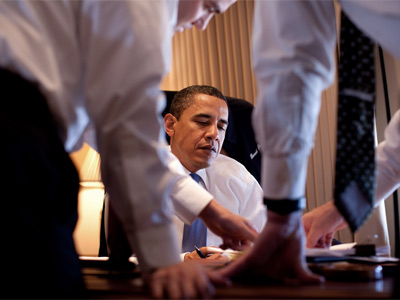Obama's New Iran Red Line
Let's hope it goes better than the last one.
 Six months. That is President Obama’s latest “red line.” In this case, it is the six months during which, under the administration’s much ballyhooed agreement with Iran, the two sides will work toward a “comprehensive agreement” that would put an end to that country’s nuclear program. Of course, that comprehensive agreement would not be reached in those six months. But Iran’s intentions supposedly will be put to the test: should it seek to circumvent the agreement, the sanctions that have been eased under its terms would come back in full force.
Six months. That is President Obama’s latest “red line.” In this case, it is the six months during which, under the administration’s much ballyhooed agreement with Iran, the two sides will work toward a “comprehensive agreement” that would put an end to that country’s nuclear program. Of course, that comprehensive agreement would not be reached in those six months. But Iran’s intentions supposedly will be put to the test: should it seek to circumvent the agreement, the sanctions that have been eased under its terms would come back in full force.
But what are the terms of that agreement? The White House has identified many of the specifics, but it has also left too many issues unresolved. For example, the agreement does not terminate Iran’s ability to enrich uranium; it only limits the type of enrichment Iran can conduct. Evidently, the agreement implicitly recognizes the “right” of Iran to enrich nuclear material, even though the Obama administration, like its predecessors, previously had been adamantly opposed to an enrichment program that has never before been recognized as a “right.”
Similarly, the agreement requires Iran not to commission, fuel or test for fuel at the Arak heavy water reactor. On the other hand, it does not require Iran to dismantle a reactor whose only real utility is for reprocessing that would enable Iran to separate plutonium from spent fuel.
Likewise, the agreement calls for half the centrifuges at the Natanz nuclear facility and three-fourths of those at Fordow to be rendered inoperable. It does not call for their removal or destruction.
In return for its cooperation, and adherence to the agreement, Iran will receive about $7 billion in relief from sanctions. In essence, Iran will be receiving $7 billion in unrestricted foreign aid. This is an amount far greater than the United States provides to any other country on earth.
Israeli prime minister Benjamin Netanyahu has condemned the deal, calling it “a historic mistake.” He has emphasized that “Israel is not bound by this agreement.” More ominously, he has also stated that “The Iranian regime is committed to the destruction of Israel and Israel has the right and the obligation to defend itself, by itself (emphasis mine)…Israel will not allow Iran to develop a military nuclear capability.”
The Gulf Arab states, notably Saudi Arabia and the United Arab Emirates, have not been anywhere nearly as vocal. But that is not their wont. Their displeasure at the deal is palpable.
It is unlikely that Israel will act against Iran over the next six months. Jerusalem will wait to see if Iran attempts to circumvent the agreement, and if so, whether sanctions will be restored in full force. The Israelis will also monitor the behavior of the P5+1, notably Russia and China, to see if they are backing away from their commitments under the agreement. And Israel will also take heed of Iran’s rhetoric, which has already labelled the agreement a “defeat” for Zionists.
It is after those six months, which constitute Obama’s new “red line,” that the danger of an Israeli strike, and of a wider conflict into which the United States might unwillingly be dragged, could increase exponentially. Jerusalem (and for that matter, the Gulf) feels that it has at best been ignored and at worst been double-crossed by the Obama administration. It no longer will give Obama the benefit of any doubt.
Netanyahu in particular is unlikely to accept the White House’s assurances of its support if little or no additional progress has been made toward eliminating Iran’s nuclear capability in the next six months, or if the sanctions begin to unravel once the six months have passed. A recent Israeli poll showed that some two-thirds of the population expect that Israel would take action against Iran on its own, if the need arose for a military strike. The Israeli prime minister knows that he will have his people behind him. He will not allow Iran to develop a weapon on his watch. Six months’ grace is all he is likely to grant Barack Obama.
The President has set himself yet another red line. He seems to have forgotten his recent near-debacle when he articulated a red line regarding the Assad regime’s employment of chemical weapons. This time, he needs to ensure that Iran does not cross that line. For, should matters go awry, it is most unlikely that the “cavalry” in the person of Vladimir Putin will arrive just in time to bail him out once again.
Dov Zakheim served as the undersecretary of defense (comptroller) and chief financial officer for the U.S. Department of Defense from 2001–2004 and as the deputy undersecretary of defense (planning and resources) from 1985-1987. He also served as DoD's civilian coordinator for Afghan reconstruction from 2002–2004. He is a member of The National Interest's advisory council.
